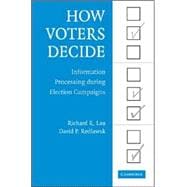
What is included with this book?
| Part I. Theory and Methods: 1. Introduction | |
| 2. A new theory of voter decision making | |
| 3. Studying voting as a process | |
| 4. What is correct voting? | |
| Part II. Information Processing: 5. What voters do - a first cut | |
| 6. Individual differences in information processing | |
| 7. Campaign effects on information processing | |
| Part III. Politics: 8. Evaluating candidates | |
| 9. Voting | |
| 10. Voting correctly | |
| 11. Political heuristics | |
| Part IV. Conclusion: 12. A look back, and a look forward | |
| Part V. Appendices and references. |
The New copy of this book will include any supplemental materials advertised. Please check the title of the book to determine if it should include any access cards, study guides, lab manuals, CDs, etc.
The Used, Rental and eBook copies of this book are not guaranteed to include any supplemental materials. Typically, only the book itself is included. This is true even if the title states it includes any access cards, study guides, lab manuals, CDs, etc.